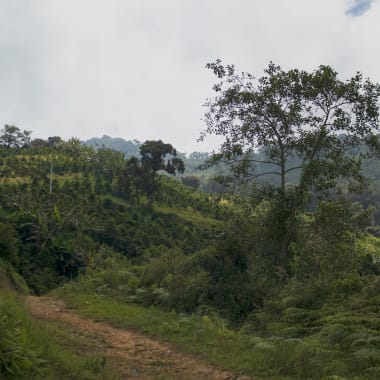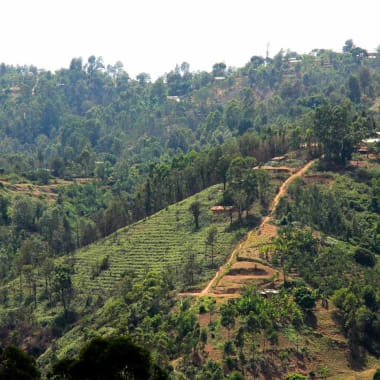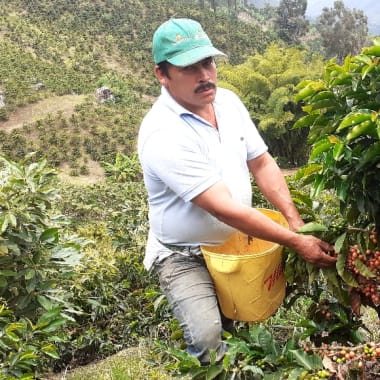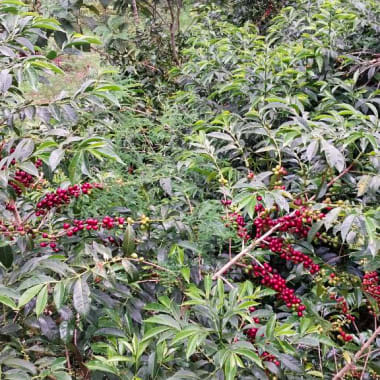Kenya
Kaguyu
We find flavours of winey, raspberry, toffee apple
This coffee comes to you from Kenya’s Kirinyaga county. You might have noticed that we usually share the names of the producer of the coffee you’re drinking, but as with almost all coffee from Kenya this one is only traceable to the factory, or mill level.
Most Kenyan farmers own between 1/8 to ¼ of a hectare, and often grow coffee alongside other crops, which means they rely on a central processing service to handle the sale and processing of their coffee.
Producers deliver coffee cherry to a factory, where the cooperative will sort, weigh, and issue payment for the delivery. The coffee is then blended with the rest of the day’s deliveries and goes on to be processed.
Because of this system, serving from hundreds to several thousands of smallholder farmers per factory, there is limited traceability down to the individual producers whose coffee comprises the lots.
Kaguyu Factory is located near Kerugoya town in the Ndia division of Kirinyaga county in Kenya. The factory services around 850 members, growing an average of 200 trees on each farm.
They’re growing most common varieties match those most typical in Kenya: SL-28, SL-34, and Ruiru 11.
The farms in this area have red volcanic soil, and the producers also grow tea, bananas, and corn on their plots, under shade provided by macadamia, eucalyptus, and gravellea trees.
Coffee crops are picked ripe and brought to the factory for depulping, washing, and soaking; farmers receive training every year from the factory manager, and “field days” hosted by the Ministry of Agriculture and agrochemical companies. The factory’s water comes from the Rutui river, and there are soaking pits for recycling the water.
Read more about the intricacies of Kenyan coffees at Cafe Import’s Harvest Report: Kenya 2020 – Complicated Is Beautiful.
Sourcing and ingredients
100% SL28, SL34, and Ruiru 11 coffee beans, provided by Cafe Imports and roasted by us on Gadigal land / Sydney.
Country grade: Unknown ?
Packaging
Bag: ABA Certified home compostable
Label: Recyclable
Valve (on bags larger than 250g): General waste
Coffee ordered online is shipped in a recyclable cardboard box
Brewing this coffee
We recommend brewing this coffee 15–49 days post-roast. If pre-ground, brew as soon as possible. Our advice on storing coffee.
1:3
dose:yield
ratio
To brew on espresso, we recommend using 20g of beans (dose) to get 60g of espresso out (yield), during 24-28 seconds.
1:16.7
beans:water
ratio
To brew in infusion/fed brewers (V60, Chemex) use a ratio of 1:16.7 ratio of beans:water.
1:14.3
beans:water
ratio
To brew in immersion brewers (plunger, AeroPress, Kalita, batch brewer) we recommend using a 1:14.3 ratio of beans:water
1:12
beans:water
ratio
To brew as cold brew we recommend using a 1:12 ratio of beans:water
Varietals
Ruiru 11 varietal
Released in 1985, Ruiru 11 is a disease resistant varietal developed in Kenya
SL28 varietal
SL28 was developed in 1931 by Scott Laboratories to suit the growing conditions in Kenya. The varietal is known for its exceptional cup quality
SL34 varietal
Developed by Scott Laboratories in Kenya, the SL34 varietal was designed to be high yielding with good cup quality.
The location
Coffee from Kenya
Alongside Ethiopia and Colombia, Kenya is one of the origins we get most excited about at the roastery. It exports some of the most vibrant, bright, and unique coffees in the world.
The Kirinyaga region of Kenya
This region is located east of Nyeri, and has similarly rich volcanic soils and a high percentage of smallholder producers.

Subscribe to a world of coffee
Discover a new single origin coffee from Sample every 1-5 weeks with no delivery fees.
No up-front purchase, and you can pause, cancel, or change plans at any time.
Available to order online this week:

Colombia Canta Ranas
Flavours of yellow peach, orange juice, raspberry, rosehip
Body Acidity
Washed Chiroso
May 2024 harvest
Roasted omni for filter and espresso
Colombia Canta Ranas online
Kenya Gathaithi
Flavours of burnt toffee, orange, cola
Body Acidity
Washed SL-28, SL-34, Ruiru 11, Batian
November 2023 harvest
Roasted omni for filter and espresso
Kenya Gathaithi online
Colombia Faver Emir Ninco
Flavours of cola, cherry, blood orange
Body Acidity
Washed Pink Bourbon
March 2024 harvest
Roasted omni for filter and espresso
Colombia Faver Emir Ninco online
Ethiopia Bekele Gemeda
Flavours of orange marmalade, peach, apricot
Body Acidity
Washed Ethiopian Heirloom
January 2024 harvest
Roasted omni for filter and espresso
Ethiopia Bekele Gemeda online